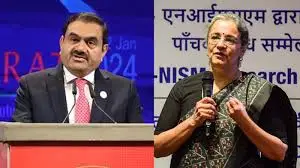Lokpal clean chit to Buch: Not even an iota of credible evidence exists

Background of the Allegations
These allegations emerged after Hindenburg Research released a report in early 2023, accusing the Adani Group of financial misconduct and stock manipulation. Following the report, anonymous individuals filed complaints against Buch. They claimed she had:
- Personal connections to Adani-linked offshore funds
- Mishandled the SEBI inquiry to benefit the Adani Group
They suggested that Buch’s financial interests might have influenced her regulatory decisions.
Lokpal’s Review and Response
The Lokpal Bench, led by Justice A.M. Khanwilkar, thoroughly examined the complaints. It concluded that the accusations lacked substance. Importantly, the complainants failed to verify any of their claims or present supporting evidence.
Moreover, they did not submit affidavits confirming their efforts to authenticate the allegations. Instead, they relied entirely on the Hindenburg report and media coverage, without adding any new facts.
As a result, the Lokpal stated:
“There is not even an iota of credible material furnished… The allegations are unsubstantiated and bordering on frivolity.”
Criticism of the Complainants
The Lokpal criticized the complainants for misusing the anti-corruption platform. It accused them of:
- Targeting Buch without cause
- Using public platforms to speculate rather than investigate
- Attempting to defame a public servant without evidence
Because of this, the Lokpal concluded that the complaints appeared politically motivated rather than genuine efforts to uphold accountability.
Why This Decision Matters
1. Vindication for Madhabi Puri Buch
This ruling clears Buch’s name and restores her professional reputation. As SEBI’s first female chairperson, she played a key role in modernizing market surveillance and enforcement practices.
2. Upholding Due Process
By dismissing these complaints, the Lokpal reinforced a crucial principle: accusations must be backed by facts, not speculation. Institutions need to protect honest officials from politically charged attacks.
3. Demonstrating Lokpal’s Relevance
Although critics often highlight the Lokpal’s lack of prosecutions, this decision shows that the body can play an important role in filtering out baseless complaints. The ruling underscores its ability to maintain focus on meaningful anti-corruption efforts.
Conclusion
Ultimately, the Lokpal’s decision to exonerate Madhabi Puri Buch sends a strong message. In today’s politically charged environment, institutions must rely on facts, not headlines. While holding public officials accountable remains essential, the process must ensure fairness and evidence-based scrutiny.
This case serves as a reminder: real oversight demands real proof.






